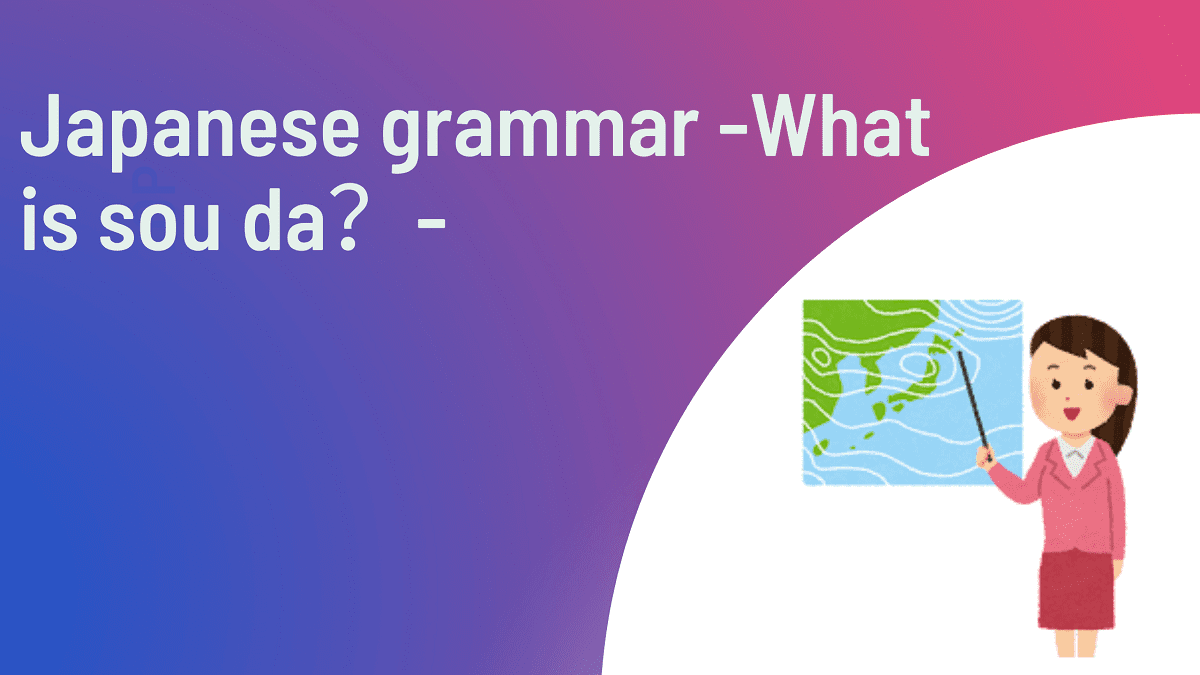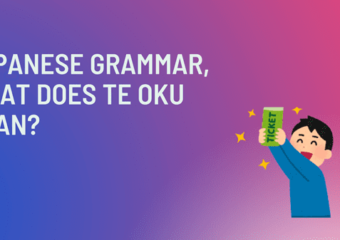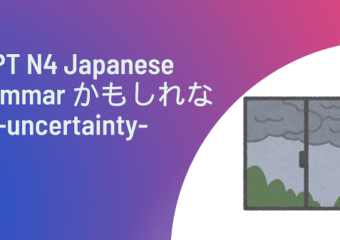When you tell someone that it’s about to rain or I hear that it’s going to rain, you can use そうだ.
In this article, I will teach you what そうだ is and how to use it.
I have been teaching Japanese for 4 years, so you will understand souda when you finish reading this article.
There are practice exercises at the end of this article, so please read to the end.
*Are you looking for a place to practice Japanese?
Youtonihongo is for you.
You may receive one free 30-minute trial lesson.

The free trial class online
We offer online classes and in person classes
What is そうだ?
そうだ has three meaning.
- Looks like/Seems like.
- About to/Expectation.
- I heard…
Let’s take a look closer.
Look like/Seeming
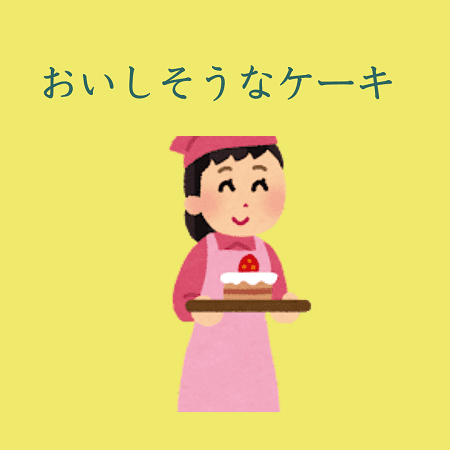
ナadj+そうだ
(ex) ひまです→ひまそうだ
イadjい+そうだ
(ex) おいしいです→おいしそうだ
*いいです→よさそうだ
そうだ+noun→そうな noun
(ex)たかそうなくるま
We use そうだ to describe something’s appearance or condition judged only by looking at it.
Let’s see some examples.
Japanese:
そのケーキ、おいしそう!
English:
The cake looks yummy.
They looked at the cake and they thought it was yummy.
Japanese:
よさそうな カメラですね。
English:
The camera looks good.
When そうだ connects a noun, the conjugation is like ナ adjective.
be about to/expectation
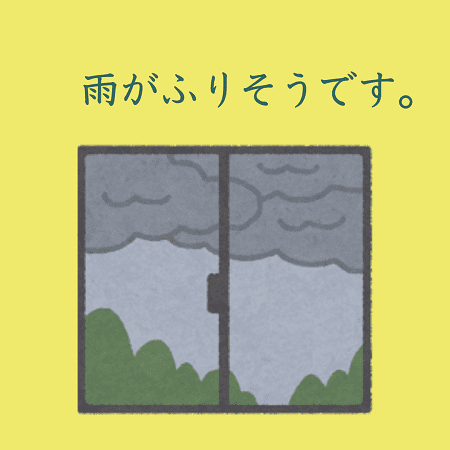
Vます+そうだ
(ex)おわります→おわりそうだ
We use そうだ when you say that something will happen soon, right before an action or change.
We also use そうだ when we say what we think or predict will probably happen in the future.
Japanese:
あかちゃんが いまにも なきそうだ。
English:
That baby looks like he’s about to crying.
Japanese:
もうすぐ 雨が ふりそうだ。
English:
It seems that it’s going to rain soon.
Like these cases, when it seems that something will happen soon, you can use そうだ.
Japanese:
ちょっと まって。もうすぐ おわりそう。
English:
One second. I think I will finish soon.
He expects his work will finish soon.
Like this case, when you think something will happen in the future, you can use そうだ.
Let’s see one more example for this.
Japanese:
やまに のぼるのは つかれそうです。
English:
I think climbing mountains will make me tired.
He expects that climbing mountains is tiring, so you can use そうだ.
I heard…
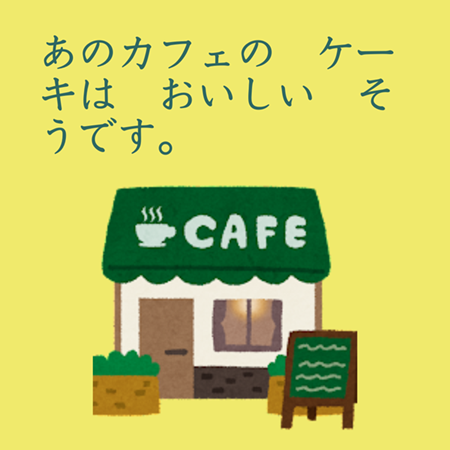
Plain form +そうだ
If you don’t know what plain form is, please read this article.
Let’s learn Japanese plain form.
We use そうだ when we tell a person some information you get from the media or some other person.
Let’s see some examples.
Japanese:
あのカフェの ケーキ おいしい そうですよ。
English:
I heard the cake at that café is delicious.
Japanese:
きょうは 雨が ふるそうです。
English:
I heard it’s going to rain today.
Japanese:
かれの カメラは いいカメラだ そうです。
English:
I heard his camera is good.
conclusion
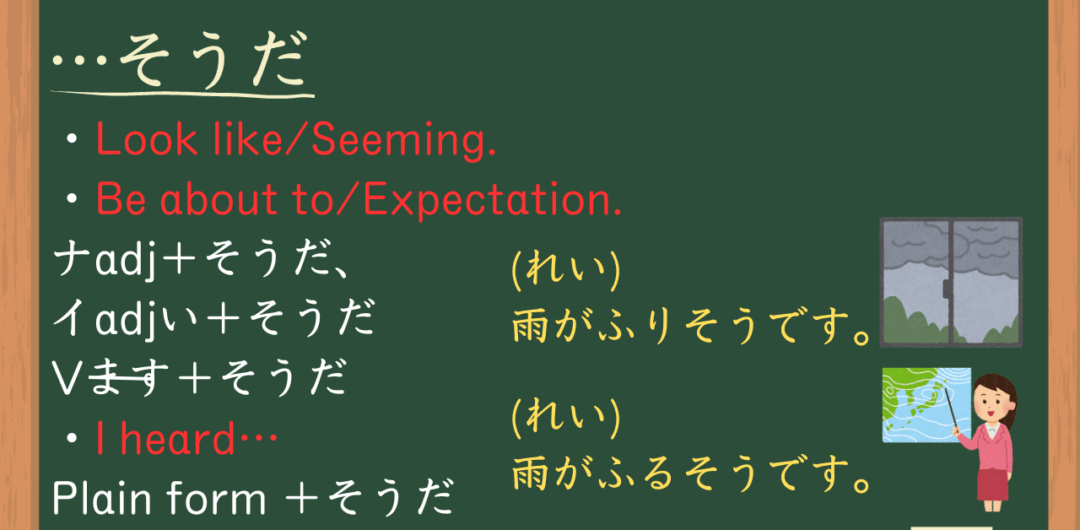
We use そうだ to describe something’s appearance or condition judged only by looking at it.
ナadj+そうだ
(ex) ひまです→ひまそうだ
イadjい+そうだ
(ex) おいしいです→おいしそうだ
*いいです→よさそう
そうだ+noun→そうな noun
(ex)たかそうなくるま
We use そうだ when you say that something will happen soon, right before an action or change.
We also use そうだ when we say what we think or predict will probably happen in the future.
Vます+そうだ
We use そうだ when we tell a person some information you got from the media or some other person.
Plain form +そうだ
Excercise
1.そのかばん、とても(たかいです→ )ですね。いくらしましたか。
2.コップが(おちます→ )。きをつけて。
3.きいた?あのふたり、(けっこんします→ )ですよ。
4.(かなしいです→ )かおをして、どうしたんですか。
5.(いいです→ )カメラですね。
6.てんきよほうによると、あしたは(はれます→ )です。
7.あのえいがは(おもしろいです→ )ですよ。もうみましたか。
8.ともだちが いっていましたが、かれの びょうきは あまり(よくない→ )です。
9.なにこれ?えを かくのは あまり(とくいじゃない→ )ですね。
10.わたしの ともだちは あした ニューヨークへ(いきます→ )です。
Answer
1.そのかばん、とても(たかいです→たかそう)ですね。いくらしましたか。
2.コップが(おちます→おちそう)。きをつけて。
3.きいた?あのふたり、(けっこんします→けっこんするそう)ですよ。
4.(かなしいです→かなしそうな)かおをして、どうしたんですか。
5.(いいです→よさそうな)カメラですね。
6.てんきよほうによると、あしたは(はれます→はれるそう)です。
7.あのえいがは(おもしろいです→おもしろいそう)ですよ。もうみましたか。
8.ともだちが いっていましたが、かれの びょうきは あまり(よくないです→よくないそう)です。
9.なにこれ?えを かくのは あまり(とくいじゃない→とくいじゃなさそう)ですね。
10.わたしの ともだちは あした ニューヨークへ(いきます→いくそう)です。
If you have questions about this exercise, please contact me or leave a comment below.
If you’d like to learn more Japanese, please feel free to contact me.
I teach Japanese in-person or online.
↓Please feel free to contact me.

The free trial class online
We offer online classes and in person classes
